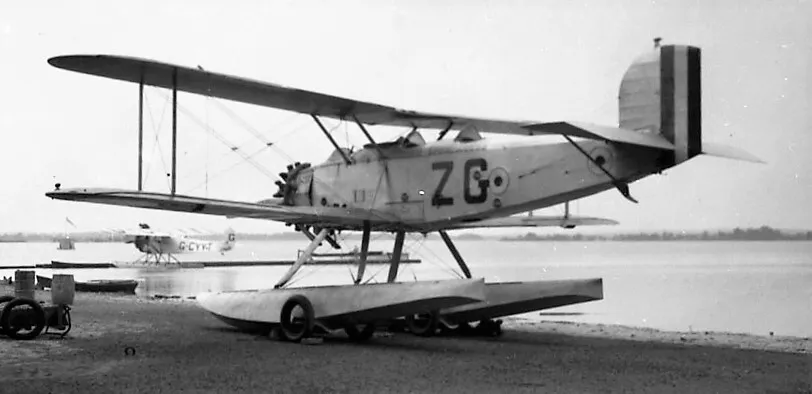O-2 (Total: 3, Canadian: 1, Group 0)
Douglas O-2

Source Harold A Skaarup Web Page
Douglas MO-2BS Seaplane, RCAF Reg. No. G-CYZG, Ottawa Air Station, Ontario.
The Douglas O-2 biplane family was one of the longest-lived American designs during the inter-war period. Entering service with the US military as early as 1924, some later models were still service at the outbreak of the Second World War. The O-2 design featured conventional construction for the period with a welded steel tube fuselage and wooden wings. Fuel was carried in extra thick centre section stubs for the lower wings. O-2B models were identical the original O-2A model series except the former feature dual controls.
The RCAF's single O-2BS was originally purchased directly from Douglas during O-2 production for the US Army. In fact the aircraft was delivered factory fresh in a US Army colour scheme. It was acquired by Mr J.D. McKee, a wealthy American aviation-enthusiast, and was first used in a Trans Canada flight from Montréal to Vancouver in September 1928. The aircraft was flown on this historic trip by Squadron Leader A.E. Godfrey of the RCAF. After the unfortunate death of Mr McKee in an aviation accident in Québec, the RCAF then acquired the aircraft. It was subsequently converted to MO-2B standard and was equipped with a Pratt & Whitney 425 hp Wasp A radial engine. It was converted at the same time to a silver colour scheme and carried the G-CYZG registration. The aircraft could carry an extra seat in this configuration and the aircraft was then used for photographic survey work for the rest of its career with the RCAF until late 1929
.When James McKee bought the aircraft, it was given the United States civil registration NC236. The aircraft was taken on strength with the Royal Canadian Air Force on 22 August 1927. It was struck off strength on 8 January 1931. Harold Skaarup web page
O-2 O-2BS/MO-2B serial G-CYZG
s/n GCYZG
c/n 265
G-CYZG
Known Units:
Registered as NC236 when puichased by J. D. McKee. Used by J.D. McKee for trans-Canada flight 11 to 19 Sept 1927 (Montreal to Vancouver, on floats), with RCAF crew. Purchased by RCAF after death of McKee. Converted to MO-2B after purchase. This may have made it the first P&W powered aircraft in the RCAF. Used for photo surveys and demonstration air mail flights. Forced landing on ice of Ottawa River following engine problems, 31 January 1929. Was on air mail flight, Montreal to Ottawa. Towed to RCAF Station Rockcliffe onboard a sleigh.last update: 2025-November-19
1930-January-08 Struck off Strength 2019-08-20